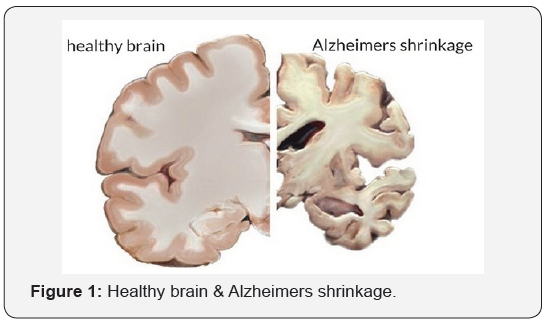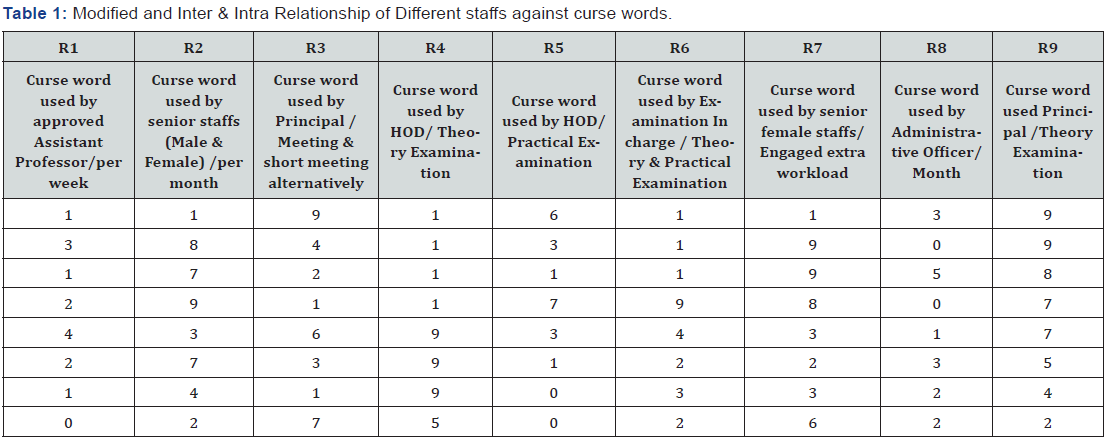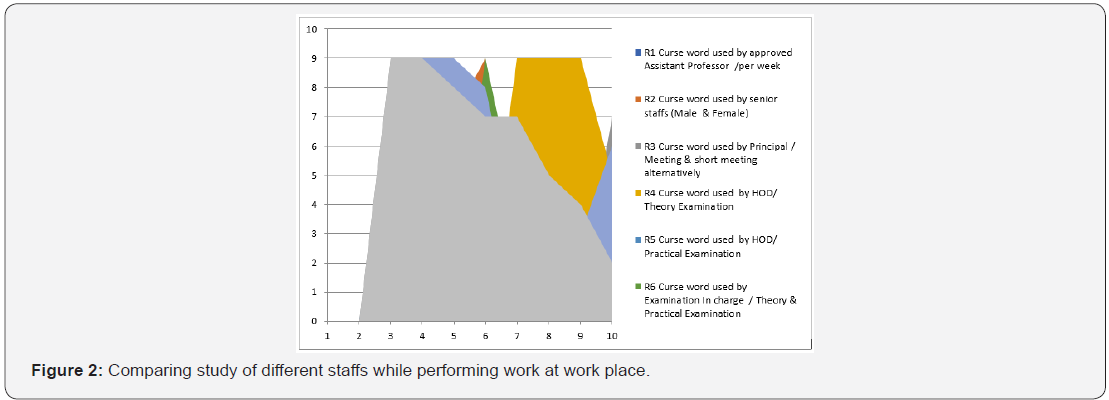Depression‐Level Effectiveness of the Curse Words in Young Adults in Pune University- Juniper Publishers
Juniper
Publishers-Open Access Journal of Reviews & Research
Depression and substance abuse has on the increase
all over the world. The poor and the rich are also involved in this
dangerous habit that has impact not only on reproductive health but also
has an impact on family, society, increase in health care expense and
increased criminal activity. Health care providers have more concerned
with treating the victims and less concerned on its prevention. Pregnant
women bear a greater brunt and there has adverse pregnancy outcome. Low
birth weight, preterm labour, increased in miscarriage and raised
perinatal mortality has some of the adverse effects. Children of such
parents have more likely to inherit this bad trait. Children living in
abusive homes where drugs and alcohol abuse occur simultaneously has
often deprived of more than just the basics of food and shelter.
Depression has, “Any act on the part of the husband, partner or family
which causes physical, mental, social or psychological trauma to the
woman and prevents her from developing her personality.” Reason for the
increase in depression violence has; urbanization, industrialization,
growth of urban slums, co-education and co-working in offices and
factories, modern movies, television, obscene and pornographic
literature and decreasing religious restrictions.
Keywords: Cursing; Depression; Anger; Young adults; Curse words abuse
Introduction
As we aware sex lives in unhealthy brain (Figure 1).
The research investigated whether young adults’ use of curse words have
related to depression and anger. Prior research has suggested links
between the use of curse words and anger and between depression and
anger [1,2]. In a large study involving university undergraduates, we
assessed depression, frequency of curse word usage, and expressive
anger. The results showed that for women, but not men, the relationship
between the use of curse words and depression has mediated by anger
[3,4]. Cursing has significantly related to depression in men. These
results suggest that the use of curse words may be useful in identifying
men experiencing depression symptoms non-clinical investigation in
privately manage co-educational pharmaceutical institution in pune
university. Implications for using verbal behaviours as indicators of
depression have discussed. Prior research has shown
that anger can be a major symptom in those experiencing depression.
Verbal behaviour has an important source of information about
individuals seeking mental health treatment, such as those seeking
treatment for depressions. The focus of the present research must
investigate the extent to which depression lead to the use of some forms
of verbal behaviour, such as use of curse words examination had been
done dilation of pupil, skin tone of women.

The effects that depression has on both the
individual and society had far-reaching. Depression significantly
decreases quality of life at the individual level. Recent economic
analyses have shown that the cost of major depressive disorder in the
India pharmacy institution in private for personal benefit has goes up
in 2017, considering direct, suicide-related, and workplace costs.
Factors such as decreased productivity at work and increased health care
costs to employers have increased over time as depressive disorders
have become more widespread. The World Health Organization estimates
that depression will be the second most prevalent disorder in the world
if it continues to increase at the current rate (WHO, 2016). According
to the Diagnostic and Statistical Manual- Fifth Edition (2013), major
depressive disorder (MDD) and related depressive disorders have
characterized by persistent. Depression has also a relationship between
age variation in heterosexual attraction and using depressive words to
expressed forced sex and abuse habit [5,6]. Depressive symptoms that
affect normal functioning, such as loss of interest or pleasure, loss of
happiness, loss good looking, loss of easy smile, dirt body smell,
unhygienic staff, and loss of
health principal in previously enjoyed activities and disturbance
of mood and acidity personality, personality of urine disorder
and cancer prone personality has also an extended cause of depression
in middle age staff of pharmacy institution. A variety of
other possible symptoms such as change in weight or appetite,
disordered sleep, and fatigue, skin rashes and lupus may also
present.
Major depressive disorder has characterized by symptomology
for at least two weeks, whereas longer lasting mood disorders
such as persistent depressive disorder (previously medical
science called dysthymia) can last for up to five years, with
depressive symptoms similar to MDD. Depression occurs with a
variety of other psychological and physical conditions, such as
anxiety and chronic illness that can accept by the body structure,
body asymmetry and body line. Young adults such as college students
have diagnosed with depression at a very high rate, and
depression has been identified as the number one health problem
among college students cannot ignored. Not everyone who
has depressed seeks treatment or perceives the need to seek
treatment. Lack of treatment leads to decreased quality of life
and increased economic burden associated with depressive disorders.
Current estimates suggest that of individuals who have
experiencing depressive symptoms, only 70-75% seeks treatment,
data shows National Association of Psychological Science
India (Regd.). Common reasons for not seeking treatment
include inability to access treatment due to financial or untold,
stigma due to cultural expectations, embarrassment, or a need to
cope with issues internally without the help of others. Alternatively,
some individuals may not perceive the severity of their depressive
symptoms to be great enough to seek treatment. While
symptoms such as low mood, fatigue, and sleep issues, inability
of love has somewhat commonly known to be associated with
depression, there have some symptom patterns that may not be
as familiar. For example, lack of ability to concentrate, memory
problems, and physical symptoms such as gastrointestinal issues
or migraines can also be indicators of depression. Irritability and
anger can be symptoms of depression. Externalizing behaviours
such as these maybe expressed as self-destructive behaviour,
such as risk-taking and substance abuse, especially for men. It
has been well documented that there has sex differences in the
symptoms of depression unawareness of love sex [7,8].
Women has more likely to exhibit higher levels of internalizing
symptoms (e.g., stress, rumination), while males have more
likely to exhibit more externalizing symptoms (e.g.., aggression).
In addition, women have more frequently diagnosed with depressive
disorders and depressive symptoms for females have
found to be more severe that comes under not to true principal
of health. In a 2015 study, college of pharmacy Pune University
found that, in a large sample of individuals diagnosed with Major
Depressive Disorder (MDD) females had higher reported levels
of comorbidity and symptom severity including symptoms such
as: weight gain, anxiety, and suicidal ideation. It has been suggested
that the increased negative symptomology experienced
by females when compared to males might be due to ovarian
hormones and varying levels of sensitivity to adrenal hormones
in the hypothalamic-pituitary-adrenal (HPA) axis when exposed
to stress. Other explanations pertaining to the sex-differences
between depression symptoms and behaviour have focused
largely on cultural gender socialization. Specifically, in western
cultures, males have more frequently socialized to believe that it
has more socially acceptable to exhibit anger while females have
not this could be why depressed males engage in more externalizing
symptoms (i.e., aggression) than females. The purpose of
the present research must test the hypothesis non-clinical investigation
that individuals who have experiencing depression
symptoms produce some forms of verbal behaviours, such as use
of curse words. We further hypothesized that the relationship
between cursing and depression may be mediated by anger. Separate
lines of research have shown that anger has related to depression
and that anger has related to cursing with higher levels
of anger related to higher levels of both depression and cursing.
The body of literature documenting the relationship between
anger and depression has vast. The link between anger and depression
has known.
The degree of anger and severity of depression has positively
correlated. Aggression, irritability, and hostility has related
terms that refer to anger directed out Wardley [9,10]. The cognitive
act of rumination mediated the relationship between depression
and anger in nonclinical community sample of adults,
suggesting that anger and depression interact in a way that has
characterized by both internal and external manifestations. Indeed,
found that cognitive components of anger/hostility predicted
increases in depression among a sample of nonclinical
older adults. Anger mediated the relationship between college
students’ emotion regulation abilities and their depression. The
students have a nonclinical sample, like the one reported in the
present study. The relationship between anger and cursing has
been substantially examined as well. Primary purpose of cursing
is to express emotions such as anger, and to portray that emotion
to others through the verbal behaviour of cursing. Cursing has
been shown to have a dampening effect on intense feelings of
anger and frustration, providing an outlet for expression without
requiring the person to necessarily engage in aggressive physical
acts to channel the emotion. Points out that the intensity of curse
words can be adjusted [11,12].
Method
Participants
Fifty-five (20 women, 25 men) undergraduates who has enrolled
in courses in the department Pune University Pune participated
in exchange for course credit. The sample has 8% White, 5% Black, 6% Obese; 5% unsymmetrical body; 1% living with
poor sanitation and 1% alcohol dependent. Sixty five percent of
the sample reported high family income to be 60,000 or more.
Materials
Participants completed survey in which the use of curse
words, depression symptoms, anger, and demographics have assessed.
We assessed participants’ use of curse words using the
self-report method described by researcher (2017). Participants
have asked to rate the frequency with which they used 10 curse
words used frequently by Marathi speakers (i.e., Bhikari, do not
respect, fake smile, showing up high style, do not come to college,
what do you want, forcefully sign, go to home, come with
your father, second nature). Frequency of usage has rated on a
6-pointscale (1 = never, 2 = rarely, as in once or twice a year, 3 =
occasionally, as in once or twice a month, 4 = about once or twice
a week, 5 = about once or twice a day, and 6 = three to five times
day, and 7 = more than five times a day).
Procedure
Participants viewed the invitation to participate in the study
on SONA, which directed them to the survey which has implemented
with a professional license of Surveymonkey.com. Additional
information collected form college muster, signature style,
colour of signature, font size and treatment received by administrative
officer while signed the muster.
Data Collection
Data has collected using a 10-item semi-structured questionnaire
administered one-on-one in private by a trained male female
staffs study team member. The questionnaire has informed
by prior studies examining determinants of depression experience
in other settings, piloted in 8 individuals, and modified
accordingly to better achieve the aims of the study. The primary
outcome, past 3-month experience of depression perpetrated
by either the participant’s senior or a member of the approve
assistant professor, has measured using the small city mind set
depression and control. That has a culturally-tailored depression
measure, composed of 105 items informed by qualitative interviews
with community members and individuals working directly
with depression survivors in Pune University pharmaceutical
Institutions living with poor sanitation (PUPILPS) that surveys
control, psychological, physical, pupil dilations and mind script,
and has validated in married male female staffs residing in Pune
Pharmaceutical Institutions. Potential correlates of depression
experience (Table 1, Figure 2) has surveyed across 10 domains:


a) socio-demographics
b) depression conceptualization and acceptance
c) the marital relationship and marital family relationship
d) telephonic communication and behaviours
e) sexual attraction
f) reproductive health
g) staffs abuse and gambling
h) stress
i) resilience
j) social support.
Results
Several variables have dropped from consideration due to
collinearity. In choosing between variables, those with greater
correlation with the outcome has used. For example, age and
education of the respondent has both associated with age and
education of the staffs; therefore, the staff’s variables have used.
Similarly, the amount of premarital contact has associated with
how well the participant felt. A multivariable model for Domain
R6 from curse word used by examination In charge / theory &
practical examination has not run longer because after accounting
for collinearity, only this variable, capacity to communicate
willingness to have approval power., that domain has a candidate
prior 3-month betting and gambling has excluded from the final
model because of the low frequency of affirmative response.
The final model has shown in domain R 10 In the result, depression
experience has significantly associated with less educational
attainment by the participant’s staffs, less satisfaction of the
family with the mainplane they received at the time of work,
poorer conflict negotiation skills, and greater acknowledgement
of depression occurrence in family and friends. The research examined
the relationships among use of curse words, anger, and
depression symptoms to determine whether cursing may be
predictive of depression symptoms in young adults. The results
confirmed that for women, the relationship between use of curse
words and depression symptoms was mediated fully by expressive
anger. For men, the relationship between depression and
use of curse words was not significant. The present research had
many similarities in findings with previous research. First and
foremost, the present study found that females reported higher
levels of depression than males. I would like to request Hon’ble
Present Prime Minister of India to stop approval of course who
has poor level sanitation, low level oxygen uptake, abuse words
used by head of the department, I would also like to request
Hon’ble present prime minister to check the Ashaaram pattern
in private Pharmaceutical Institution in Pune University.
Alcohol dependency from adult men in service privately
managed pharmaceutical institutions and not allow licence to
permit open a wine shop nearer to pharmaceutical Institutions.
Conclusion
Use a plant-based protein blend diet pea - lowers levels of
hunger hormone, ghrelin. Quinoa -chock full of anti-inflammatory
compounds called flavonoids. Hemp - contains 20 amino acids,
healthy omega fats and fibre (including 9 the body cannot make
on its own). Coconut - packed full of healthy saturated fats that
go straight to the liver for a quick energy boost. Monk fruit - contains
powerful antioxidants called MoGro sides. Cinnamon - clinically
proven to support healthy blood sugar levels AND healthy
triglyceride levels. Vanilla Bean - loaded with minerals like magnesium,
potassium, and calcium. Vanilla also has mood-boosting
and energy enhancing effects on body. Zero alcohol use.
Acknowledgment
This study has been guided by under supervision and guidance
of Renowned Laboratory Scientist and Immunologist Respected
Dr. Ramesh Paranjape’ Retd. Director and Scientist ‘G’
National AIDS Research Institute India. I express my deep gratitude
towards Respected Sir’ for motivation and being great
knowledge source for this research.
For more Open Access
Journals in Juniper
Publishers please click on: https://juniperpublishers.com
For more articles in Open Access Journal of Reviews &
Research please click on:
https://juniperpublishers.com/arr/index.php
https://juniperpublishers.com/arr/index.php
To know more about Open Access Journals please
click on: https://juniperpublishers.com/index.php


Comments
Post a Comment